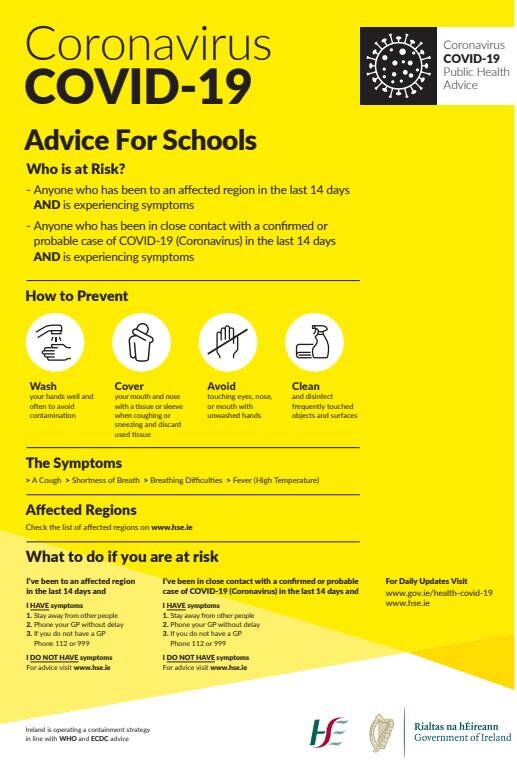Information for Parents
CORONA VIRUS, Influenza and Influenza-like Illness (Flu and ILI)
The Department of Education and Skills has received a letter from the Chief Medical Officer at the Department of Health, Dr Tony Holohan, with advice to parents of school children travelling from regions affected by Covid-19. The letter is available at the following link: https://www.education.ie/en/The-Department/Announcements/information-for-schools-preschools-and-third-level-institutions-on-the-coronavirus.html
The link below is to the Health Protection Surveillance Centre (HPSC) website which contains specific guidance for educational settings.
https://www.hpsc.ie/a-z/respiratory/coronavirus/novelcoronavirus/guidance/educationguidance/
What is Influenza?
Influenza is an acute infectious respiratory illness caused by the influenza virus. Influenza can occur throughout the year but usually peaks in winter. There are three main types of influenza with influenza A and influenza B causing the majority of human infections. Influenza viruses infect the nose, throat and lungs. They can cause mild to severe illness and, if severe, especially in vulnerable people such as the very young and the elderly can lead to death. The main symptoms are fever (temperature > 38.0C (100.40F), tiredness, chills, dry cough, sore throat, headache, muscle and joint pains. Sometimes it can be difficult to distinguish between influenza and the common cold. Influenza is diagnosed by the laboratory using swabs from the nose and throat. Often the symptoms are so characteristic that a laboratory test is not necessary.
Symptoms Influenza Common Cold
Precautions
The best way to prevent flu is by getting the flu vaccine each year. Pupils and teachers under 65 years of age do not need to be vaccinated unless they belong to a risk group for influenza. Risk groups include:
Those with certain underlying medical conditions (e.g. Chronic respiratory disease, including cystic fibrosis, moderate or severe asthma, chronic heart disease, diabetes mellitus, chronic renal failure, chronic liver disease, down syndrome, chronic neurological disease including multiple sclerosis).
Those with an impaired immune system.
Persons with a body mass index (bmi) over 40.
Pregnant women.
Children with any condition that can compromise respiratory function (e.g. Cognitive dysfunction, spinal cord injury, seizure disorder, or other neuromuscular disorder).
Children with moderate to severe neurodevelopmental disorders such as cerebral palsy and intellectual disability.
Children on long-term aspirin therapy.
Further information on risk groups for the flu vaccine is available at http://www.immunisation.ie/en/Downloads/NIACGuidelines
Strict adherence to hand hygiene is essential to prevent spread. Environmental cleaning (see chapter 6) and respiratory etiquette (see Appendix 6) are also important. Children under 18 with influenza should not be given aspirin or any aspirin containing products due to an association with Reyes syndrome, a very serious and potentially fatal condition. If there is an outbreak of influenza in the school the local Department of Public Health should be informed who can provide advice on management of the outbreak.
Exclusion
Staff or pupils with influenza should remain at home for 5 days from when their symptoms began. In general persons with flu are infectious for 3-5 days after symptoms begin but this may be up to a week or more in children. Staff or pupils should not re-attend school until they are feeling better and their temperature has returned to normal. Contacts do not need to be excluded unless they develop symptoms of influenza.
Resources
Useful information on influenza can be found on the HPSC website and the National Immunisation Office website


